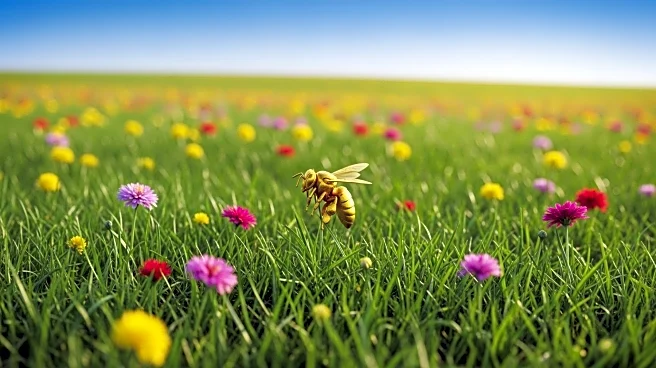What's Happening?
The United States agricultural biologicals market is expected to reach USD 13,382.11 million by 2032, driven by increasing demand for sustainable agriculture practices. Key players such as Monsanto Company, BASF SE, and Bayer AG are leading the market, which includes products like biofertilizers, biopesticides, and biostimulants. These products are designed to enhance crop growth, protect against pests and diseases, and improve soil health, thereby reducing chemical dependency and promoting eco-friendly farming. The market is experiencing rapid growth due to rising plant disease prevalence and increased product registrations and approvals, particularly for biofertilizers and biostimulants. Technological advancements in bioformulations, including innovations in microbial strains and plant growth-promoting bacteria, are improving product efficiency and adoption rates.
Why It's Important?
The growth of the agricultural biologicals market is significant as it reflects a shift towards more sustainable farming practices in the U.S. This trend is crucial for reducing environmental impact and chemical dependency in agriculture, which can lead to healthier ecosystems and improved public health. The adoption of biologicals integrated with precision farming technologies allows for more targeted application of bio-based inputs, enhancing crop yields and soil fertility. This shift is supported by government initiatives and policies promoting organic and sustainable farming, which can lead to long-term benefits for the agricultural sector and contribute to food security. As farmers increasingly adopt these technologies, the market is poised for substantial growth, offering opportunities for innovation and investment in sustainable agriculture.
What's Next?
The agricultural biologicals market is expected to continue its growth trajectory, with further advancements in precision farming technologies and digital tools like AI-based advisory systems for real-time crop monitoring. These innovations will likely enhance the efficiency and specificity of biological products, driving their adoption in integrated pest management. As government support and subsidies for sustainable farming practices increase, more farmers may transition to using biological inputs, potentially leading to a reduction in chemical pesticide use. The market's expansion could also encourage more research and development in bioformulations, fostering new product innovations and improving the overall sustainability of the agricultural industry.
Beyond the Headlines
The shift towards agricultural biologicals may have deeper implications for the U.S. agricultural sector, including ethical considerations around the use of genetically engineered microbial products. As these innovations become more prevalent, there may be discussions around the regulation and safety of such products. Additionally, the move towards sustainable farming practices could influence cultural attitudes towards agriculture, promoting a greater appreciation for eco-friendly and organic produce. Long-term, this trend could lead to significant changes in agricultural policy and consumer behavior, with increased demand for transparency and sustainability in food production.










